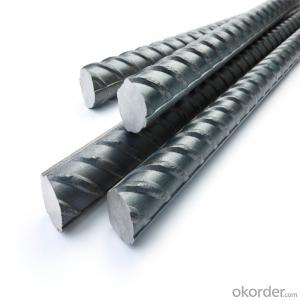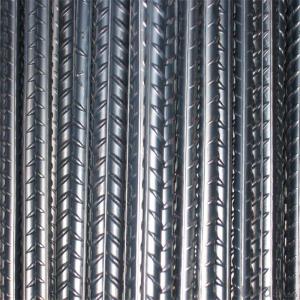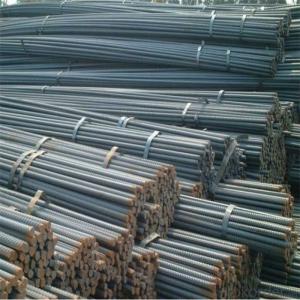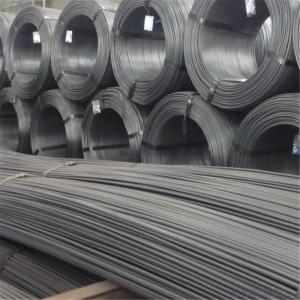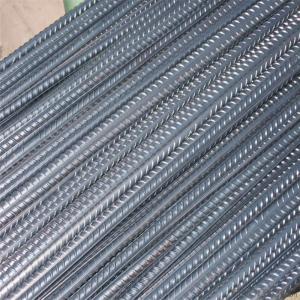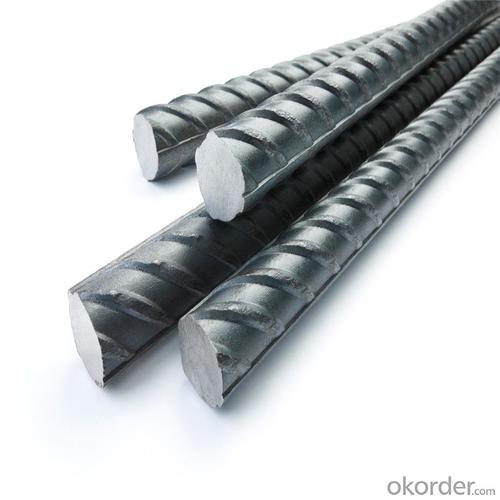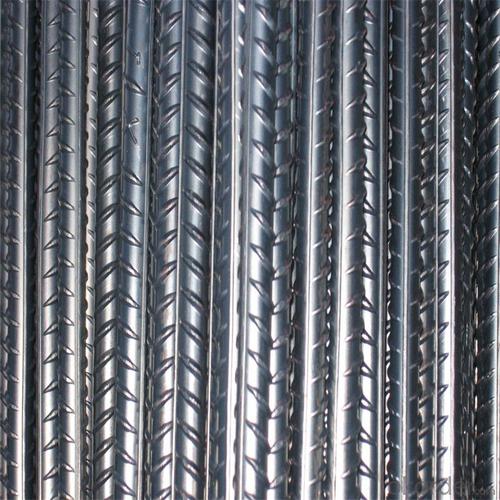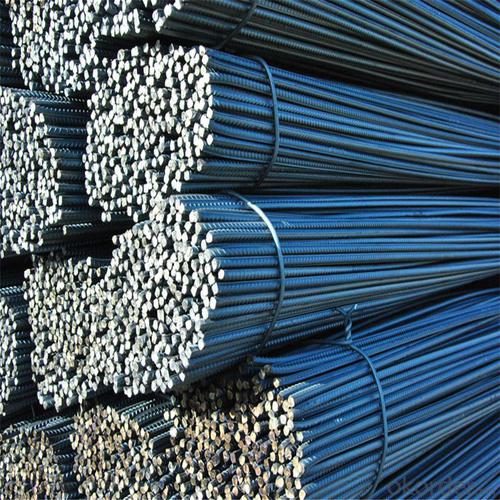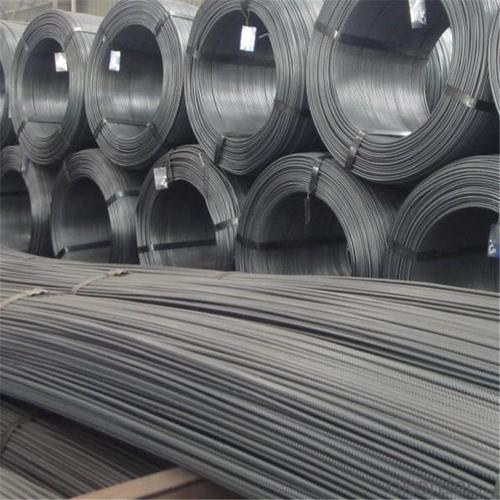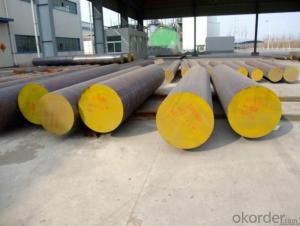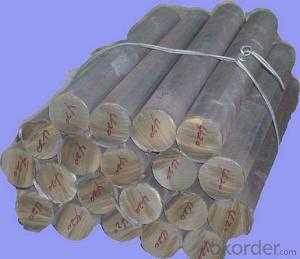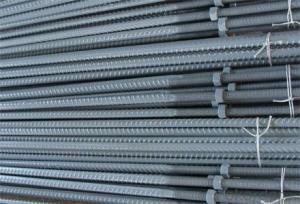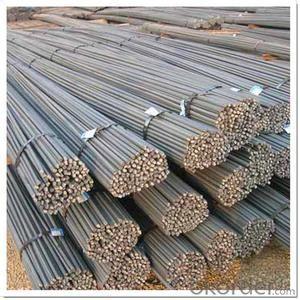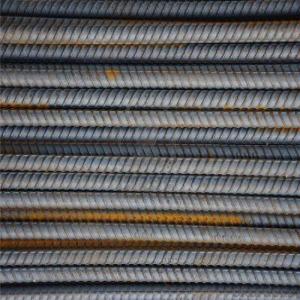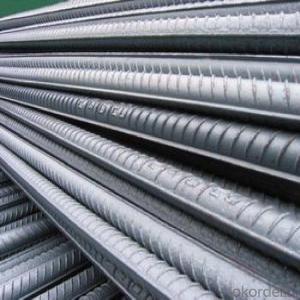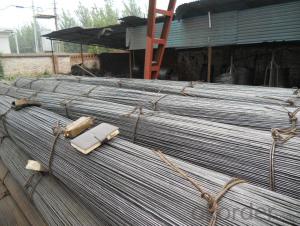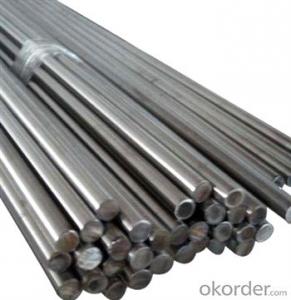Gr40 Ribbed High Quality Steel Rebar
- Loading Port:
- Tianjin
- Payment Terms:
- TT OR LC
- Min Order Qty:
- 170 m.t.
- Supply Capability:
- 500000 m.t./month
OKorder Service Pledge
OKorder Financial Service
You Might Also Like
Specification
Gr40 Ribbed High Quality Steel Rebar
Description of Gr40 Ribbed High Quality Steel Rebar
1, Diameter: 5.5mm-10mm Gr40 Ribbed High Quality Steel Rebar
10m- 40mm Gr40 Ribbed High Quality Steel Rebar
2, Length: 6m, 9m, 12m or customized
3, Standard: GB, ASTM, AISI, SAE, DIN, JIS, EN
OEM technology - send detailed technical parameters for accurate quotation.
2, Produce Process: smelt iron - EAF smelt billet - ESR smelt billet -
hot rolled or forged to get the steel round bar and plate
3, Heat Treatment: annealing, normalizing, tempering, quenching
4, Surface Treatment: Black
5, Quality Assurance: We accept third party inspection for all orders.
You can ask testing organizations such as SGS, BV, etc. to test our products before shipping.
Chemical Composition of Gr40 Ribbed High Quality Steel Rebar
Grade | Technical data of the original chemical composition(%) | |||||
Reinforcing steel bar HRB335 | C | Mn | Si | S | P | B |
≤0.25 | ≤1.60 | ≤0.80 | ≤0.045 | ≤0.045 | >0.0008 | |
Physics Capability | ||||||
Yield Strength(N/cm2) | Tensile Strength(N/cm2) | Elongation(%) | ||||
≥ 335 | ≥490 | ≥16 | ||||
Reinforcing steel bar HRB400 | C | Mn | Si | S | P | B |
≤0.25 | ≤0.16 | ≤0.80 | ≤0.045 | ≤0.045 | 0.04-0.12 | |
Physics Capability | ||||||
Yield Strength(N/cm2) | Tensile Strength(N/cm2) | Elongation(%) | ||||
≥ 400 | ≥ 570 | ≥ 14 | ||||
Products Show of Gr40 Ribbed High Quality Steel Rebar
Company Information
CNBM International Corporation is the most important trading platform of CNBM group.
Whith its advantages, CNBM International are mainly concentrate on Cement, Glass, Iron and Steel, Ceramics industries and devotes herself for supplying high qulity series of refractories as well as technical consultancies and logistics solutions.


F A Q
1, Your advantages?
professional products inquiry, products knowledge train (for agents), smooth goods delivery, excellent customer solution proposale
2, Test & Certificate?
SGS test is available, customer inspection before shipping is welcome, third party inspection is no problem
3, Factory or Trading Company?
CNBM is a trading company but we have so many protocol factories and CNBM works as a trading department of these factories. Also CNBM is the holding company of many factories.
4, Payment Terms?
30% TT as deposit and 70% before delivery.
Irrevocable L/C at sight.
5, Trading Terms?
EXW, FOB, CIF, FFR, CNF
6, After-sale Service?
CNBM provides the services and support you need for every step of our cooperation. We're the business partner you can trust.
For any problem, please kindly contact us at any your convenient time.
We'll reply you in our first priority within 24 hours.
- Q: How does the heat treatment process affect the hardness of special steel?
- The heat treatment process can significantly affect the hardness of special steel. By subjecting the steel to controlled heating and cooling cycles, the microstructure of the steel can be altered, leading to changes in its hardness. Hardening, for example, involves heating the steel to a high temperature and then quenching it rapidly, resulting in a harder and more brittle material. On the other hand, tempering, which involves reheating the hardened steel at a lower temperature, can reduce the brittleness while maintaining a desirable level of hardness. Thus, the heat treatment process allows for precise manipulation of the hardness of special steel to meet specific requirements.
- Q: How is special steel used in the production of heat exchangers?
- Special steel is widely used in the production of heat exchangers due to its unique properties that make it ideal for this application. Heat exchangers are devices designed to transfer heat from one medium to another, and special steel offers several advantages in this process. Firstly, special steel has excellent thermal conductivity, meaning it can efficiently transfer heat from one fluid to another. This property is crucial for heat exchangers, as it allows for the rapid and efficient exchange of thermal energy. Additionally, the high corrosion resistance of special steel makes it highly suitable for heat exchanger applications. Heat exchangers often come into contact with corrosive fluids or gases, and regular steel may corrode over time. However, special steel is specifically designed to resist corrosion, ensuring the longevity and reliability of the heat exchanger. Furthermore, special steel offers exceptional strength and durability, allowing heat exchangers to withstand high pressures and temperatures. Heat exchangers often operate in challenging environments, and special steel can withstand these harsh conditions without compromising its structural integrity. Special steel also provides excellent weldability and formability, making it easier to manufacture complex heat exchanger designs. Its versatility allows for the production of heat exchangers in various shapes and sizes, catering to the specific needs of different industries. In summary, special steel is used in the production of heat exchangers due to its high thermal conductivity, corrosion resistance, strength, durability, weldability, and formability. These properties ensure efficient heat transfer, resistance to corrosion, and the ability to withstand harsh operating conditions, making special steel an ideal material for heat exchanger applications.
- Q: What are the different applications of tool special steel?
- Tool special steel is a versatile material with unique properties that finds applications in various industries. Some of the diverse uses of this steel include: 1. Cutting Tools: In the manufacturing of drills, saw blades, milling cutters, and lathe tools, tool special steel is widely employed. Its exceptional hardness, wear resistance, and toughness ensure long tool life and superior cutting performance. 2. Dies and Molds: Tool special steel is extensively used in the production of dies and molds for metalworking and plastic injection molding processes. It is suitable for these demanding applications due to its ability to withstand high temperatures, resist wear and deformation, and maintain dimensional stability. 3. Automotive Industry: Tool special steel is employed in the automotive industry for various components such as crankshafts, gears, camshafts, and engine valves. Its outstanding strength, fatigue resistance, and heat resistance qualities contribute to the overall durability and performance of automotive parts. 4. Aerospace Industry: The aerospace industry utilizes tool special steel for applications such as turbine blades, aircraft engine components, landing gears, and structural parts. Its high strength, corrosion resistance, and ability to withstand extreme temperatures and pressure make it an ideal choice for these critical applications. 5. Construction and Mining: In the construction and mining sectors, tool special steel is used for equipment like excavator buckets, rock drills, bulldozer blades, and drilling bits. Its remarkable hardness, toughness, and resistance to abrasion enable these tools to withstand the harsh conditions encountered in these industries. 6. Tooling Industry: In the tooling industry, tool special steel is extensively employed in the manufacture of various types of tools and equipment. Hand tools, power tools, and precision instruments all benefit from the exceptional strength, hardness, and resistance to wear and deformation of tool special steel. 7. Medical Industry: In the medical field, tool special steel is utilized for the production of surgical instruments, orthopedic implants, and dental tools. Its biocompatibility, corrosion resistance, and ability to be sterilized make it suitable for these critical applications. These examples highlight the numerous applications of tool special steel. Its unique properties make it a valuable material in various industries where durability, strength, and precision are essential requirements.
- Q: What are the different tool steel alloys?
- Tool steel, a type of steel containing carbon and alloy, is specifically designed for producing tools, dies, and cutting applications. There are various tool steel alloys available, each possessing unique properties and characteristics. 1. Carbon Tool Steels: These steels have a higher carbon content, typically ranging from 0.60% to 1.00%. They provide excellent hardness, wear resistance, and toughness, rendering them suitable for cutting and forming tools. 2. High-Speed Tool Steels: These steels are engineered to endure high temperatures while maintaining their hardness and strength at elevated speeds. They usually contain alloying elements like tungsten, molybdenum, and vanadium. 3. Shock-Resistant Tool Steels: These steels are specially formulated to withstand high impact or shock loads without fracturing. They offer exceptional toughness and are frequently utilized for chisels, hammers, and other tools subjected to intense impact forces. 4. Hot-Work Tool Steels: These steels are designed to retain their hardness and strength at high temperatures, making them ideal for applications involving hot forming or forging processes. They exhibit outstanding thermal conductivity and wear resistance. 5. Cold-Work Tool Steels: These steels are specifically designed for applications involving cutting, shearing, and forming at room temperature or lower. They possess high hardness, wear resistance, and toughness, enabling them to withstand the stresses associated with cold-working operations. 6. Mold Steels: Mold steels are primarily used in the production of molds for plastic injection molding, die casting, and extrusion processes. They offer good machinability, high wear resistance, and excellent dimensional stability. 7. Stainless Tool Steels: Stainless tool steels combine the corrosion resistance of stainless steel with the hardness and toughness of tool steel. They are commonly used in applications where both wear resistance and corrosion resistance are required. These examples represent just a fraction of the tool steel alloys available in the market. Each alloy possesses distinct properties and applications, enabling manufacturers to select the most suitable tool steel for their specific requirements.
- Q: What are the main factors affecting the heat resistance of special steel?
- The heat resistance of special steel is determined by several key factors, including its alloy composition, microstructure, and heat treatment. The addition of specific elements like chromium, nickel, molybdenum, and tungsten can enhance the steel's ability to withstand high temperatures by forming stable oxide layers on its surface, which protect against oxidation and corrosion. The microstructure of special steel also plays a role in its heat resistance. Factors like grain size, phase distribution, and the presence of precipitates can affect the steel's thermal stability. Fine-grained structures and a homogeneous phase distribution improve resistance to creep, while precipitates like carbides or intermetallic compounds strengthen the steel and prevent thermal softening. Heat treatment processes, such as quenching and tempering, have a significant impact on the heat resistance of special steel. Proper heat treatment optimizes the microstructure and enhances mechanical properties, including resistance to thermal degradation. Controlled quenching, for example, promotes the formation of a martensitic structure, which increases hardness and strength at high temperatures. Other factors that influence heat resistance include impurities, surface conditions, and environmental factors. Impurities like sulfur and phosphorus can reduce resistance to high temperatures by promoting brittle phase formation or oxidation. Surface conditions, such as roughness or cracks, can cause localized heating and accelerated degradation. Environmental factors like corrosive gases or high humidity can also promote oxidation or corrosion. In conclusion, the heat resistance of special steel is affected by alloy composition, microstructure, heat treatment, impurities, surface conditions, and environmental factors. Understanding and optimizing these factors are crucial for developing special steel with superior heat resistance for various industrial applications.
- Q: How does special steel contribute to the electronics aftermarket industry?
- The electronics aftermarket industry greatly relies on special steel, which is crucial for producing high-performance materials necessary for various electronic components. It offers several contributions to the industry: 1. Durability and reliability: Special steel alloys possess exceptional strength, hardness, and resistance to wear and corrosion. This makes them ideal for manufacturing electronic parts that can withstand harsh operating conditions, ensuring the longevity and reliability of electronic devices, which is a vital requirement for the aftermarket industry. 2. Heat dissipation: Many electronic devices generate significant heat while in operation, which can negatively impact their performance and lifespan. Special steel alloys with excellent thermal conductivity properties enable efficient heat dissipation, preventing overheating and enhancing the overall performance of electronic components. 3. Precision manufacturing: Special steel alloys, such as stainless steel, can be precisely machined, allowing for the production of intricate and complex electronic parts. This is particularly important for the aftermarket industry, which often involves replacing or repairing specific components in electronic devices. 4. Electromagnetic shielding: Special steel alloys are useful for creating electromagnetic shielding, which is crucial in preventing interference and maintaining the integrity of electronic signals. This is especially significant for sensitive electronic equipment that may be affected by external electromagnetic fields. 5. Customization and adaptability: Special steel can be tailored to meet the specific requirements of electronic devices, facilitating the production of custom-made components. This versatility enables manufacturers in the electronics aftermarket industry to develop and offer a wide range of specialized products that cater to diverse consumer needs and preferences. In conclusion, special steel plays a significant role in the electronics aftermarket industry, providing durable, reliable, and high-performance materials necessary for manufacturing electronic components. Its unique properties enable the production of long-lasting and efficient devices, while also allowing for customization and adaptability to meet the ever-changing demands of the market.
- Q: What are the different types of tool steel?
- There are several types of tool steel, including high-speed steel, cold work steel, hot work steel, and shock-resisting steel. Each type is specifically designed for different applications and has unique properties to withstand various conditions and demands. High-speed steel, for example, is known for its ability to retain hardness at high temperatures, making it suitable for cutting tools. Cold work steel is used for applications involving cutting, shearing, and forming metals at lower temperatures. Hot work steel, on the other hand, is designed to withstand high temperatures and is commonly used in die casting and forging. Lastly, shock-resisting steel is used in applications where the tool is subjected to high impact or sudden shocks, such as in chisels or hammers.
- Q: How does special steel contribute to the automotive parts industry?
- Special steel plays a crucial role in the automotive parts industry as it offers enhanced strength, durability, and resistance to corrosion. This type of steel is specifically designed to meet the demanding requirements of various automotive components, such as engine parts, chassis, and suspension systems. By utilizing special steel, automakers can ensure that their vehicles possess the necessary structural integrity and reliability, ultimately enhancing safety and performance. Additionally, the use of special steel allows for the production of lighter and more fuel-efficient vehicles, contributing to the industry's efforts in reducing carbon emissions and promoting sustainability.
- Q: What are the different methods of hardening special steel?
- There exist various techniques for strengthening special steel, each possessing its own merits and suitable applications. 1. Quenching: A widely employed approach for steel hardening, it entails heating the steel to a critical temperature and rapidly cooling it in a quenching medium such as oil, water, or air. This rapid cooling prompts the formation of a martensitic structure, rendering the steel harder but more brittle compared to its original state. 2. Tempering: Following quenching, steel is often subjected to tempering to decrease brittleness and enhance toughness. This process involves reheating the hardened steel to a specific temperature and maintaining it at that temperature for a predetermined duration. By doing so, internal stresses are reduced, and the overall mechanical properties of the steel are improved. 3. Case hardening: Employed to augment the hardness of the outer layer of steel while preserving a tough and ductile core, case hardening involves introducing carbon or nitrogen into the steel's surface through methods like carburizing or nitriding. This results in the creation of a hardened surface layer while retaining the desired properties within the core. 4. Induction hardening: Particularly useful for localized hardening of specific regions within a component, this technique employs an electromagnetic field to solely heat the desired area of the steel, followed by rapid quenching. Induction hardening allows precise control over the hardened region while maintaining desired properties in the remainder of the component. 5. Cryogenic treatment: Involving subjecting hardened steel to extremely low temperatures, often below -150°C (-238°F), this process further refines the steel's microstructure, enhancing its hardness, wear resistance, and dimensional stability. 6. Flame hardening: This method entails heating the steel's surface using a high-temperature flame and subsequently quenching it. Flame hardening is typically employed for large components or specific areas requiring localized hardening. Selecting the appropriate method is crucial and dependent on the steel's specific requirements and intended application. Factors such as desired hardness, toughness, wear resistance, and dimensional stability play a pivotal role in method selection.
- Q: How does the microstructure of special steel affect its performance?
- The performance of special steel greatly depends on its microstructure. To enhance their properties and meet specific application requirements, special steels are alloyed with specific elements. The microstructure refers to how the steel's crystalline grains are arranged and whether any phase transformations are present within the material. One important aspect of the microstructure is the size of the grains. Through controlled cooling or adding alloys, fine-grained structures can be achieved, leading to improved strength, hardness, and toughness. Smaller grain sizes restrict the movement of dislocations within the material, resulting in increased strength and hardness. This is particularly crucial in applications where high strength-to-weight ratios are needed, such as aerospace or automotive components. The presence of different phases in the microstructure is another critical factor. By adding specific alloying elements, the formation of various phases like martensite, bainite, or ferrite can be promoted. These phases possess different mechanical properties, including hardness, toughness, and corrosion resistance. By carefully controlling the microstructure, it becomes possible to customize the steel's performance for specific applications. For instance, martensitic structures offer high hardness and wear resistance, making them ideal for cutting tools, while bainitic structures provide a good balance of strength and toughness, making them suitable for structural components. Moreover, the microstructure also determines how the steel responds to heat treatment processes like quenching and tempering. Heat treatments can modify the microstructure to achieve desired mechanical properties, such as increasing hardness or improving resistance to fatigue. The ability of the microstructure to transform during heat treatment enables precise control over the steel's performance characteristics. In conclusion, the microstructure of special steel has a significant impact on its performance. Grain size, phase distribution, and response to heat treatment are all crucial factors that influence the steel's mechanical properties and suitability for specific applications. By understanding and manipulating the microstructure, engineers can design special steels with enhanced performance, meeting the demanding requirements of various industries.
Send your message to us
Gr40 Ribbed High Quality Steel Rebar
- Loading Port:
- Tianjin
- Payment Terms:
- TT OR LC
- Min Order Qty:
- 170 m.t.
- Supply Capability:
- 500000 m.t./month
OKorder Service Pledge
OKorder Financial Service
Similar products
Hot products
Hot Searches
Related keywords
